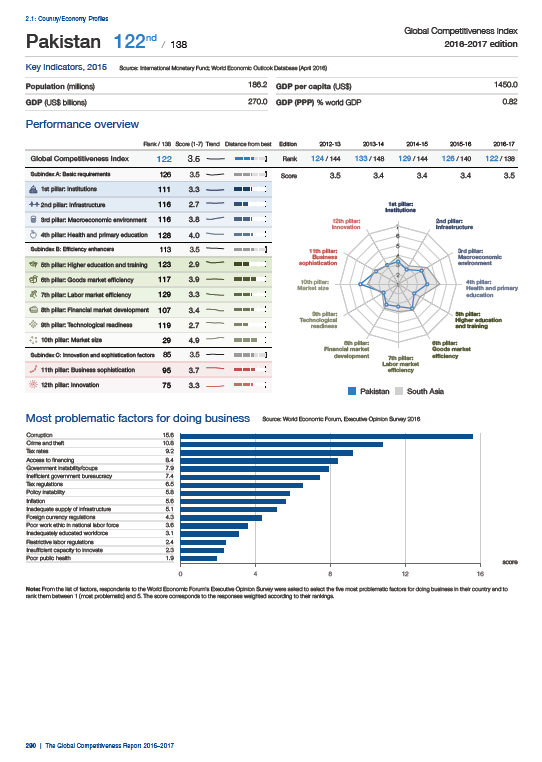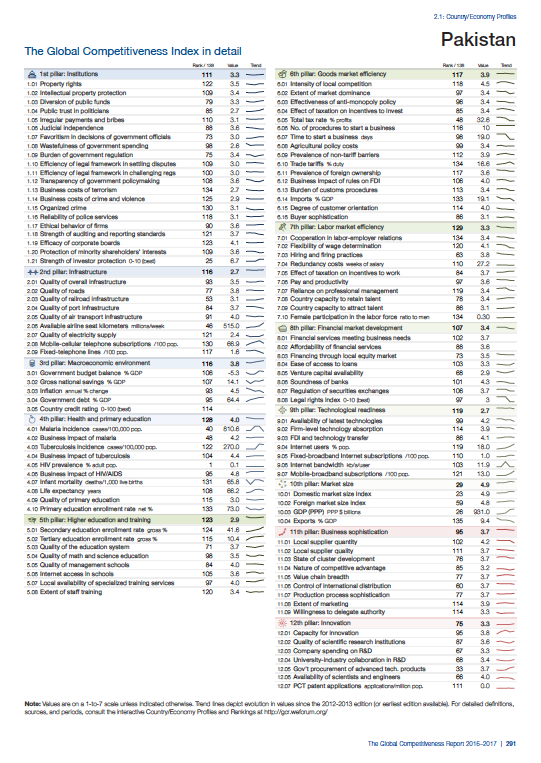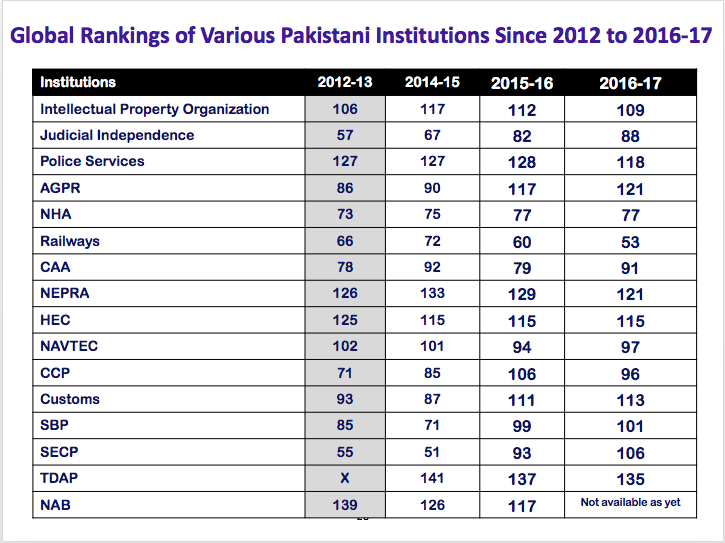Global Competitiveness Report 2016-2017 Ranks Pakistan at 122 among 138 countries.
Pakistan improves four points on the Global Competitiveness Index of the World Economic Forum. For the eighth consecutive year, Switzerland ranks as the most competitive economy in the world, narrowly ahead of Singapore and the United States.
Pakistan has shown some extraordinary recovery on the economic front, where the country has been successful in improving its macroeconomic framework to improve its global competitiveness.
Pakistan is classified as a factor driven economy, which basically depends on improving its institutions, infrastructure, macroeconomic stability, health and primary education indicators. Pakistan improved from 119 to 111 on the institutions pillars, while infrastructure improved only one point and stands at 116 this year. On the Macroeconomic Stability Pillar Pakistan jumped from 128 in 2015 to 116. A solid 12 points gain, which shows the country has made economic progress on gross national savings percentage of GDP, where Pakistan improved from 115 in 2015 to 107 this year. While the government debt percentage to GDP also ranks at 95 among 138 economies in the world. The biggest gain however is in the area of inflation; annual percentage change where Pakistan moved from 127 in 2015 to 93 in 2016.
On other pillars, among 138 countries, Pakistan ranks at Health and Primary Education 128, Higher Education and Training 123, Goods Market Efficiency 117, Labour Market Efficiency 129, Financial Market Sophistication 107, Technological Readiness 119, Market Size 29, Business Sophistication 95 and Innovation 75.
Amir Jahangir, Chief Executive Officer of Mishal Pakistan, the Country Partner Institute of the Global Competitiveness and Benchmarking Network of the World Economic Forum said, “Pakistan has shown improvements on some of the key indicators to improve its global competitiveness, however the country still needs to integrate itself into the digital and cyber world. Pakistan with approx. 186 million population offers great prospects if data and knowledge-based policy making is introduced in the country”. He further said, “decision making based on big-data can enable the governments to engage their citizens in policy making and democratization of development process. In the fourth industrial revolution Pakistan can make a larger digital footprint in the cyber world, thus making its mark on the global policy making, however the country needs to equip its next generation with education and knowledge through digital services and mobile broadband”.


Pakistan at 122, ranks last amongst its South Asian neighbors, where India leads at 39 followed by Sri Lanka 71, Bhutan 97, Nepal 98 and Bangladesh at 106. South Asia continues its upward trend as competitiveness improves in most countries in the region. India has been the best performer, climbing to 39th from 55th last year. Over the past decade, the subcontinent has focused on improving overall health and primary education levels and upgrading available infrastructure, areas of particular importance given the resource-driven nature of its economy. However, the latter remains the second weakest spot in the region, just after technological readiness.
To improve the soft-data on Pakistan, the World Economic Forum closely worked with Mishal Pakistan, the country partner institute of the Global Competitiveness and Benchmarking Network of WEF. This year a total of 350 respondents from the business community were reached out through the annual Executive Opinion Survey, whereas 114 were selected from last year and 236 from this year. The World Economic Forum reached out to 14,000 business executives globally.
The report also shows performance of some of the key regulatory bodies and other government institutions, which have shown progress as well. Among 138 countries the institutions are ranked as following: Intellectual Property Organization (109), Judicial Independence (88), Police Services (118), Auditor General of Pakistan Revenues (121), National Highways Authority (77), Pakistan Railways (53), Civil Aviation Authority (91), NEPRA (121), Higher Education Commission of Pakistan (115), National Vocational and Technical Training Commission (97), Competition Commission of Pakistan (96), Pakistan Customs (113), State Bank of Pakistan among other 138 Central Banks at (101), Securities and Exchange Commission of Pakistan at (106) and Trade Development Authority of Pakistan (135). The SEC of Pakistan has been losing its global ranking at an alarming rate from 51 in 2014 to 106 this year.

The report also indicates that a ten-year decline in the openness of economies at all stages of development poses a risk to countries’ ability to grow and innovate, according to The Global Competitiveness Report 2016-2017. The report is an annual assessment of the factors driving productivity and prosperity in 138 countries. The degree to which economies are open to international trade in goods and services is directly linked to both economic growth and a nation’s innovative potential. The trend, which is based on perception data from Global Competitiveness Index (GCI)’s Executive Opinion Survey, is gradual and attributed mainly to a rise in non-tariff barriers although three other factors are also taken into account; burdensome customs procedures; rules affecting FDI and foreign ownership. It is most keenly felt in the high and upper middle income economies.
“Declining openness in the global economy is harming competitiveness and making it harder for leaders to drive sustainable, inclusive growth,” said Klaus Schwab, Founder and Executive Chairman, World Economic Forum.
The report also sheds light on why quantitative easing and other monetary policy measures have been insufficient in reigniting long-term growth for the world’s advanced economies. The report finds that interventions by economies with comparatively low GCI scores failed to generate the same effect as those performed in economies with high scores, suggesting that strong underlying competitiveness is a key requirement for successful monetary stimulus.
The report offers insight into how priorities may be shifting for nations in earlier stages of development. While basic drivers of competitiveness such as infrastructure, health, education and well-functioning markets will always be important, data in the GCI suggests that a nation’s performance in terms of technological readiness, business sophistication and innovation is now as important in driving competitiveness and growth. The Global Competitiveness Report’s competitiveness ranking is based on the Global Competitiveness Index (GCI), which was introduced by the World Economic Forum in 2005. Defining competitiveness as the set of institutions, policies and factors that determine the level of productivity of a country, GCI scores are calculated by drawing together country-level data covering 12 categories – the pillars of competitiveness – that collectively make up a comprehensive picture of a country’s competitiveness. The 12 pillars are: institutions, infrastructure, macroeconomic environment, health and primary education, higher education and training, goods market efficiency, labour market efficiency, financial market development, technological readiness, market size, business sophistication, and innovation.
Key Findings:
- The Global Competitiveness Report 2016-2017 finds declining openness is threatening growth and prosperity.
- Monetary stimulus measures such as quantitative easing are not enough to sustain growth and must be accompanied by competitiveness reforms.
- For emerging economies, updated business practices and investment in innovation are now as important as infrastructure, skills and efficient markets.
- Switzerland, Singapore and the United States remain the world’s most competitive economies; India is the highest rising economy, climbing 16 places
- Access the full report, infographics, videos and more visit: weforum.org


